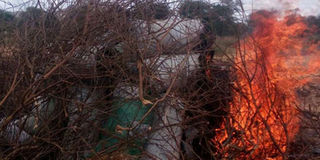Ngilu’s charcoal-coal stand contradictory

Bags of charcoal put on fire by youth in Mui, Kitui County, on February 15, 2018. Sand harvesting and charcoal burning have had an immense negative environmental effect. PHOTO | BONIFACE MWANKI
What you need to know:
- Charcoal burning leads to deforestation, which has been linked to the recurring droughts in Kitui.
- The government should invest in alternative forms of energy production, such as wind and solar.
The banning of sand harvesting and charcoal production in Kitui County, on the one hand, and the approving of coal mining in the same county, on the other hand, presents an uncomfortable narrative.
Governor Charity Ngilu’s ascent to the top-most county office last year was followed by her pledge to devote her government’s efforts to environmental conservation.
And this has registered some success, with even the National Environmental Complaints Committee applauding her charcoal and sand ban.
The governor recently proclaimed that toxic waste from charcoal is a threat to human safety.
COAL MINING
It is for that reason that her government seeks to allocate resources to projects aimed at restoring a healthy environment for all generations.
That is a bold step towards safeguarding the environment.
However, while Mrs Ngilu’s anti-charcoal stand deserves praise, her contradictory position on coal mining presents a major setback.
One of the National Energy and Petroleum Policy’s long-term goals is to facilitate development of a 960-megawatt coal-fired plant within Mui Basin — in Kitui.
This is part of efforts to revive the mining industry in the county, with the hope of realising economic growth in the shortest time possible.
DROUGHT
Reports indicate that sand harvesting and charcoal burning have had an immense negative environmental effect.
Charcoal burning leads to deforestation, which has been linked to the recurring droughts in the region.
Rivers are increasingly drying up and rainfall levels have reduced in most parts of the county, forcing residents to walk long distances in search of water for livestock and other domestic uses.
Kitui has faced prolonged drought and failed rainfall with impending water shortage year in, year out.
Burning coal to produce electricity is an incredibly water-intensive process with serious implications for both water quantity and quality.
POLLUTANT
The Kenya Red Cross Society, as part of a drought mitigation effort, has listed Kitui as one of the arid and semi-arid lands (Asal) counties targeted in the organisation’s 2018 drought response and recovery programme.
Mining coal in Kitui will not only exacerbate this situation, but also have a negative human and environmental impact that the county is working hard to mitigate.
Coal is the most-polluting energy source, emitting more than 60 different hazardous air pollutants.
Every shape and form of using coal is dirty and highly polluting. There is no such thing as “clean coal”!
The environmental effects of coal range from the poisoning of local rivers by acid mine drainage to the global problem of climate change caused by carbon dioxide emissions.
RENEWABLE ENERGY
Instead of setting up a coal plant in Kitui, the government should invest in alternative forms of energy production, such as wind and solar.
The Kitui County policy agenda needs to be holistic in nature, directing resource allocation in a manner that guides the devolved government towards viable renewable energy solutions.
Renewable energy beats coal in every context.
It will deliver decentralised energy to all Kitui residents, creating a win-win situation for job creation and the climate and energy access.
The coal industry stands in the way of a safe and healthy future for all of us.
It threatens our most basic needs — from the air we breathe to the water we drink and the safe climate in which we all seek shelter.
Remember, there are alternatives to coal but none for water.
Ms Olende is senior manager for Food for Life campaign at Greenpeace Africa. [email protected]




